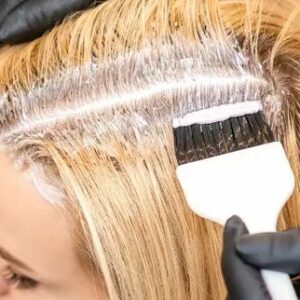Is Salt Water Good for Your Hair: When it comes to hair care, many of us are constantly on the lookout for the latest trends and products that promise to give us healthy, shiny locks. One such trend that has gained popularity over the years is the use of salt water. Some people swear by its benefits, while others are more skeptical. In this blog post, we’ll dive deep into the topic to answer the question: Is salt water good for your hair?
What is Salt Water?
Salt water is simply water that contains a significant amount of dissolved salts, primarily sodium chloride. Naturally, salt water is found in the ocean, but you can also create a salt water solution at home by mixing salt with water. Read about Can You Bleach Wet Hair
Historical and Cultural Perspectives
Throughout history, various cultures have utilized salt water for its perceived health benefits. Ancient Romans, for instance, bathed in saltwater to promote healing and relaxation. In many coastal communities around the world, ocean water has been considered a natural remedy for skin and hair care. Discover about How Much Are Hair Extensions
The Composition of Salt Water
Understanding the composition of salt water is crucial to grasp how it affects your hair. Ocean water contains a mixture of various salts and minerals, including:
- Sodium Chloride: The primary salt that dries out hair by absorbing its moisture.
- Magnesium: Known for its anti-inflammatory properties.
- Potassium: Helps in maintaining the balance of fluids and electrolytes in hair cells.
- Calcium: Strengthens hair but can also make it feel rough.
Potential Benefits of Salt Water for Hair
- Natural Exfoliant
Salt water acts as a natural exfoliant, helping to remove dead skin cells from the scalp. This can be beneficial for those who suffer from dandruff or dry scalp conditions.
- Adds Volume and Texture
Salt water can add volume and texture to your hair. The salt crystals plump up the hair shaft, making it look fuller and giving it a beachy, wavy texture.
- Cleansing Properties
The natural cleansing properties of salt water can help to remove excess oils and product buildup from the scalp. This can lead to a cleaner, fresher scalp environment.
- Healing Properties
Salt water has natural healing properties due to its mineral content. It can help to soothe irritated scalps and promote the healing of minor cuts or abrasions.
Potential Drawbacks of Salt Water for Hair
- Drying Effect
One of the biggest drawbacks of salt water is its drying effect. The salt draws moisture out of the hair, which can lead to dryness, frizz, and split ends. This is particularly problematic for those with already dry or damaged hair.
- Damage to Hair Cuticle
Repeated exposure to salt water can damage the hair cuticle, the outermost layer of the hair shaft. This can make the hair more porous and prone to breakage.
- Color Fading
For those with color-treated hair, salt water can accelerate the fading process. The salt and minerals can strip away the color, leading to dull and lackluster locks.
- Scalp Irritation
In some cases, salt water can cause scalp irritation, especially for those with sensitive skin. The salt can exacerbate conditions like eczema or psoriasis.
How to Use Salt Water Safely on Hair
If you still want to enjoy the benefits of salt water without the drawbacks, here are some tips on how to use it safely:
- Moderation is Key
Use salt water treatments sparingly. Overuse can lead to dryness and damage, so it’s best to limit your exposure to once or twice a month.
- Rinse Thoroughly
After exposure to salt water, make sure to rinse your hair thoroughly with fresh water. This will help to remove any residual salt and minimize the drying effects.

- Condition Regularly
Use a good quality conditioner to restore moisture to your hair after salt water exposure. Look for products that are specifically designed for hydration and repair.
- Protect Your Hair
Consider wearing a swim cap if you plan to spend extended periods in salt water. This can help to protect your hair from excessive exposure.
- Hydrate
Make sure to hydrate your hair from the inside out by drinking plenty of water and using hydrating hair masks or oils.
DIY Salt Water Hair Treatments
If you’re interested in trying salt water treatments at home, here are a few DIY recipes:
- Sea Salt Spray for Beach Waves
- 1 cup warm water
- 1 tablespoon sea salt
- 1 teaspoon coconut oil
- 1 teaspoon leave-in conditioner
Mix all ingredients in a spray bottle and shake well. Spray onto damp hair and scrunch for natural beach waves.
- Salt Water Scalp Scrub
- 2 tablespoons sea salt
- 2 tablespoons olive oil
- 2 drops essential oil (like tea tree or lavender)
Mix ingredients to form a paste. Massage gently onto the scalp, then rinse thoroughly.
Scientific Perspective on Salt Water and Hair
Several studies have examined the effects of salt water on hair. A study published in the Journal of Cosmetic Science found that salt water exposure can lead to an increase in hair porosity, making it more susceptible to damage. Another study in the International Journal of Trichology highlighted that salt water can exacerbate conditions like dandruff and seborrheic dermatitis.
Real-Life Experiences and Testimonials
Many people have shared their experiences with salt water and its effects on their hair. For some, the occasional dip in the ocean leaves their hair looking and feeling fabulous, with added volume and texture. For others, the drying effects lead to frizz and breakage.
Expert Opinions
Hair care experts have mixed opinions on the use of salt water. While some acknowledge its benefits for adding texture and volume, many caution against its drying effects. Trichologists often recommend using salt water treatments in moderation and combining them with hydrating products to mitigate potential damage.
Alternatives to Salt Water
If you’re looking for alternatives to achieve similar benefits without the potential drawbacks of salt water, consider the following options:
- Texturizing Sprays
Texturizing sprays can provide the same beachy waves and volume without the drying effects of salt water. Look for sprays that contain hydrating ingredients.
- Scalp Exfoliants
Scalp exfoliants can help to remove dead skin cells and product buildup, similar to the exfoliating effects of salt water. Choose products that are gentle and contain nourishing ingredients.
- Hydrating Treatments
Deep conditioning treatments and hair masks can provide hydration and repair without the risk of drying out your hair. Use these treatments regularly to maintain healthy locks.
Conclusion
In conclusion, salt water can offer some benefits for your hair, such as adding volume and texture, acting as a natural exfoliant, and having cleansing properties. However, it also comes with significant drawbacks, including dryness, potential damage to the hair cuticle, color fading, and scalp irritation. If you choose to use salt water as part of your hair care routine, it’s essential to do so in moderation and take steps to mitigate its drying effects.
FAQs
Q: Can salt water help with dandruff?
A: Yes, salt water can act as a natural exfoliant, helping to remove dead skin cells from the scalp and potentially reducing dandruff. However, it can also dry out the scalp, so it’s essential to use it sparingly and follow up with a good conditioner.
Q: Is it okay to swim in the ocean with color-treated hair?
A: While occasional exposure is unlikely to cause significant damage, frequent swimming in salt water can accelerate color fading. It’s best to protect your hair with a swim cap or rinse thoroughly and condition after exposure.
Q: Can salt water make hair grow faster?
A: There is no scientific evidence to suggest that salt water promotes hair growth. It can help to create a healthier scalp environment, which is conducive to hair growth, but it also has drying effects that need to be managed.
Q: How often should I use salt water on my hair?
A: It’s best to limit the use of salt water treatments to once or twice a month to avoid excessive dryness and damage. Always follow up with a hydrating conditioner or hair mask.
Q: What should I do if my hair feels dry after using salt water?
A: If your hair feels dry after using salt water, rinse it thoroughly with fresh water and apply a deep conditioning treatment. Regular use of hydrating hair masks and oils can also help to restore moisture.

Meet Nathan Evans, an insightful writer whose passion for exploration and understanding shines through his compelling articles. Nathan’s diverse portfolio spans topics ranging from environmental sustainability and global politics to culture, technology, and beyond. With a unique blend of meticulous research and engaging prose, Nathan captivates readers by shedding light on both contemporary issues and timeless human experiences. His articles provoke thought, inspire curiosity, and foster a deeper appreciation for the complexities of our world. Whether unraveling the impact of emerging technologies or examining cultural phenomena, Nathan’s writing offers readers a journey of discovery and enlightenment.



